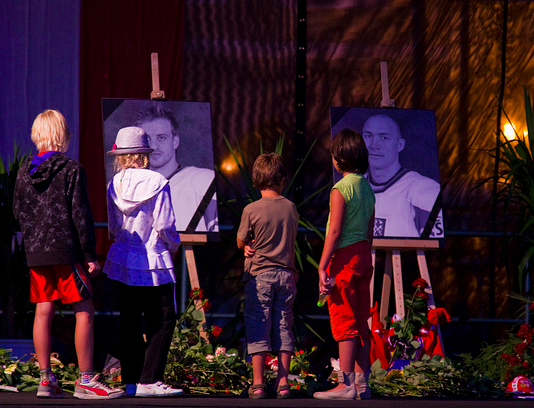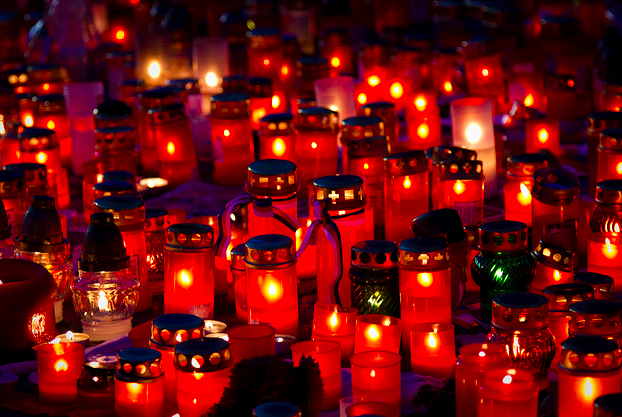Russian Hockey Tragedy: One Year Later

A perennial powerhouse in the KHL and the Russian Super League before it, Yaroslavl was still looking for playoff success. That season, their roster was filled with former NHL players and many young players, including several who helped Russia win that year's World Junior Hockey Championship, the 20-and-under tournament loaded with future NHL stars. Yaroslavl faithful were hoping that this combination of youth and veteran leadership would lead them to their first Gagarin Cup.
At 4:05pm Moscow Time, the plane carrying the team crashed shortly after takeoff, killing 44 people. Only Alexander Sizov, the flight engineer, survived.
The news quickly spread around the world. The Salavat Yulaev Ufa vs. Atlant Moscow Oblast game was halted in the second period. The global nature of hockey meant that every team in the NHL was affected, whether it was a former player, a former coach, a newly-drafted prospect, or a close friend of players on the team. It was unimaginable – an entire hockey team, gone?
It was the 10th aviation disaster in history that resulted in the death of an entire team. In a statement to the KHL, President of the International Ice Hockey Federation Rene Fasel called it, "the darkest day in the history of our sport." The KHL suspended the season until Sept. 12 to allow for a period of mourning.
In the aftermath, KHL President Alexander Medvedev offered to hold a disaster draft, a modified version of an expansion draft, to allow Lokomotiv to play that season, as well as an automatic berth in the playoffs. Dozens of players offered to play for Lokomotiv. However, Lokomotiv declined, and instead chose to play that season in the VHL, Russia's second-tier hockey league.
Friday marked the one-year anniversary of the Yaroslavl Lokomotiv disaster. In the ensuing year, memorials were held around the world for the players. A memorial held in Yaroslavl attracted over 100,000 mourners, including Russian President Vladimir Putin.
The German Ice Hockey Federation retired Robert Dietrich's number 20, and the Latvian Ice Hockey Federation retired Karlis Skrastins' number 7. Pavol Demitra, a national hero in Slovakia and already a recipient of a retired number, had his elementary school and hometown hockey arena named after him. Hockey teams everywhere wore patches and stickers commemorating those who were lost, and a game between the Washington Capitals and Pittsburgh Penguins was dedicated to the victims of the crash.
The investigation into the crash showed that pilot error was the cause. Not only did the pilot and co-pilot falsify documents about their training flying that particular aircraft, but the co-pilot was found to have banned sedative phenobarbital in his system. It was concluded that during takeoff, one pilot applied the brakes, while the other pilot attempted to takeoff as usual. These conflicting actions caused the plane to takeoff momentarily before crashing at high speeds a little over a mile from the runway.

The new Lokomotiv Yaroslavl, a team filled with former National Hockey League players, resumed play in the KHL on September 6, 2012 to a sold out arena in Novosibirsk. They beat Sibir Novosibirsk 5-2 on the back of a two-goal night by former NHLer Staffan Kronwall. Before the game, the normally hostile away crowd cheered and chanted to welcome back Lokomotiv to the KHL.
Earlier Saturday, Yaroslavl beat Amur Khabarovsk 2-1 to go 2-0 on the season. Maxim Trunyov and Yegor Averin scored, while Vitaly Vishnevsky picked up the lone assist on Averin’s goal.
The Lokomotiv Yaroslavl tragedy was the worst nightmare in sports horrifyingly coming to life. It didn't matter that the team affected was one across the globe, playing in a foreign league; it united the hockey world in support for the victims and their families. The team now once again begins their quest to win their first Gagarin Cup. But instead of having just Yaroslavl behind them, hockey fans around the world are rooting for the team to go from the lowest low to the highest high.
Reach Staff Writer Ann Frazier here.



